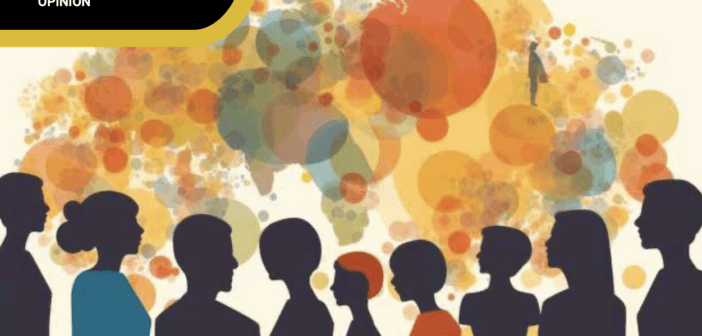By Joan Ogeto
Culture Religion and Politics
The relation between religion, culture and politics remains a captivating topic in the field of political and social philosophy, in the context of diverse societies. In numerous countries, laws and national values have deep ties with a mutually beneficial relationship between religion, cultures and traditions.
These intrinsic elements play a vital role in shaping the fabric of society, impacting social interactions and dictating societal norms. Cultural traditions and freedom of religious beliefs have sometimes been exploited and manipulated to justify human rights violations. The line between culture and religion has become blurred, with cultural practices becoming closely entwined with religious beliefs, and religious concepts becoming integral parts of culture. As these realms merge, their influence extends into politics, shaping ideologies and even triggering revolutions. This complex interplay of religion and culture shapes political landscapes, fostering social cohesion and occasionally triggers conflicts.
Certain political movements draw inspiration from cultural and religious ideologies, which can be positive in fostering unity and mobilizing communities. However, there is also a darker side where these factors contribute to prolonged crises, conflicts and a disregard for basic human rights. Finding a balance between preserving cultural identity and upholding universal human rights becomes a significant challenge faced by societies worldwide.
To better understand this issue, it is crucial to re-examine real-world instances where religion and culture have been used to fuel political movements and revolutions, both with positive and negative outcomes. The intersection of religion and politics raises philosophical problems that need to be addressed. It is essential to critically analyze how these two domains interact and influence each other to navigate their implications better.
It is true that conflicts within national borders can stem from a range of factors, however many are fuelled by cultural, traditional, and religious influences. Notably, during the Middle Ages, Christianity not only held sway over the Church but also dictated the state’s position, bestowing legitimacy upon government and state authorities. Although in contemporary times, religion is not the sole basis for democracy or the rule of law, it continues to wield significant influence over the political dimension. The Universal Declaration of Human Rights (UDHR) emphasizes the right to freedom of thought, consciousness, or belief. However, the intricate connection between culture and Freedom of Religion or Belief (FoRB) can be exploited to justify human rights violations, ultimately leading to violent extremism. This poses a grave global threat, eroding security, dignity, and well-being, while disrupting peaceful ways of life and undermining human rights.
In our contemplation of the intricate interplay between state, culture, and religion, it is crucial to transcend the notion of a simplistic one-dimensional spectrum. This relationship, often overlooked, reveals a multifaceted tapestry of three pivotal dimensions that demand consideration namely: the role of religion and culture in state affairs, the government’s influence in the religious domain, and the interplay across various aspects, such as shaping political perspectives, providing social services, and shaping education. This dynamic interplay presents us with a fascinating and complex landscape, with diverse implications for societies worldwide.
Karl Marx, a prominent German philosopher, journalist, and revolutionary socialist, extensively examined the social implications of religion. According to his beliefs, religion serves as a reflection of the social hierarchy within a society and contributes to the preservation of inequality and the status quo. Marx viewed religion as an extension of the economic struggles faced by the working class or “proletariat” and famously referred to it as “the opium of the people.” While various social theorists may hold differing perspectives, they all acknowledge the role of religion in society. In reality, religion relies on society for its existence, value, and significance, and conversely, society’s beliefs and practices are deeply influenced by religious ideas. From a conflict theory perspective, religion is perceived as an institution that perpetuates social inequality. This perspective indicates that throughout history, religion has been manipulated to justify the authority of oppressive monarchs and legitimize unequal social structures.
When perceived through the lens of liberation, religious institutions can be utilized with culture for political activism to advocate for social change. Uganda’s political landscape for instance has been profoundly shaped by the intersection of religion, culture, and politics, particularly regarding LGBTQ rights. The Anti-Homosexuality Act of 2014, also known as the “Kill the Gays” bill, vividly illustrates the impact of religious beliefs on politics. The legislation garnered strong support from religious and political leaders who argued that it upheld traditional cultural values and religious teachings. The situation exemplifies how religious principles and cultural norms can lead to harmful legislation, endangering the rights and well-being of marginalized communities.
This topic holds significance because religions often assert powerful claims on people’s loyalty, especially universal religions that extend these claims to all individuals, not just a specific community. Consequently, conflicts between religious commitments and political demands are likely to arise inevitably. A well-functioning society requires a significant degree of political social cohesion. This cohesion is crucial for citizens to see themselves as interconnected and willing to co-operate politically, while also providing a common framework for collective decision-making without limiting rights of a smaller minority.
From a contemporary perspective emphasis is placed on the value of fairness and argument made for the state’s neutrality towards religions. Intentionally disadvantaging or favoring any group is unfair and goes against the democratic principle of representing all citizens. Challenges arise when minority groups face threats to their actions and commitments, which may not be unjust in themselves, but are jeopardized by the pursuit of other societal goals or directly prohibited by law. Regarding public policy and its effect on society as a whole, the notion of neutrality is crucial. The state is expected to remain neutral and not favor any specific conception of the human good. This neutrality can be understood in terms of both procedure and effect – the state should not intend to disadvantage any group and should avoid actions that result in the unfair treatment of individuals or groups in their pursuit of the good.
John Rawls introduced the concept of “overlapping consensus,” where citizens from diverse comprehensive doctrines agree on principles of justice. Instead of imposing a particular comprehensive doctrine, a theory of justice should derive principles that citizens can reasonably accept from their own comprehensive beliefs. This approach promotes inclusivity and cooperation in a diverse society.
The notion of neutrality in the state, as highlighted by John Rawls, stands as a guiding principle in navigating the complexities of religion and politics. Ensuring equity and impartiality is imperative to establish a just and inclusive society. Striking a balance between preserving cultural identity and upholding universal human rights poses a significant challenge for governments and policymakers worldwide.
To navigate the intersection of religion, culture, and politics, societies must engage in critical introspection and foster open dialogues that embrace diversity and difference. Emphasizing the ethical benefits that arise from cultural cohesion and tolerance can pave the way for a more harmonious coexistence. Respect for individual freedoms and human rights should guide public policy, ensuring that no group is unjustly favoured or disadvantaged.
A key aspect of addressing the complexities of this relationship lies in recognizing the potential for exploitation and the misuse of religion for political gains. Safeguarding the integrity of religious institutions and their spiritual role in society is vital in preventing them from becoming tools of oppression or division. Simultaneously, acknowledging the legitimate grievances of religious minorities and ensuring their protection from discrimination is essential in upholding the principles of justice and human dignity.
Continuing to draw inspiration from historical figures such as John Locke, who ardently advocated for the virtues of tolerance and freedom in his renowned work ‘Two Treatises of Government,’ societies are reminded of the importance of upholding these principles. Locke’s insights underscore the inherent value of respecting individual liberties and nurturing an inclusive climate to forge a brighter and more harmonious world for generations to come.
In this ever-changing world, the complexity of the religion-culture-politics nexus demands an on-going examination of policies and practices that promote social cohesion, inclusivity, and respect for human rights. Engaging with diverse perspectives and seeking common ground amid differences will strengthen the social fabric and foster a climate of mutual understanding and respect.
Ultimately, the path towards a more harmonious relationship between religion, culture, and politics lies in the shared commitment of individuals, communities, and governments to uphold the values of justice, compassion, and dignity for all. By embracing the richness of cultural diversity and religious pluralism, we can forge a collective vision of a better future, where the principles of freedom, equality, and human rights form the bedrock of our societies.
In this shared journey, let us heed the lessons of history, drawing from the wisdom of the past to build a brighter and more inclusive world for generations to come. Drawing wisdom from history and steering a course towards a just and inclusive future, we can create a world where respect and compassion thrive, fostering a global community bound by empathy and understanding.
References
Bryan, D. (2012). A Case of Religion or Culture?. E-INTERNATIONAL RELATIONS. https://www.e-ir.info/2012/08/02/women-in-the-arab-world-a-case-of-religion-or-culture/
Cliteur, P., & Ellian, A. (2018). The Five Models for State and Religion: Atheism, Theocracy, State Church, Multiculturalism, and Secularism. ICL JOURNAL. https://www.degruyter.com/document/doi/10.1515/icl-2018-0056/html?lang=en
DIVERSITY AND MULTI-CULTURAL EDUCATION IN THE 21ST CENTURY. (n.d) PRESSBOOKS. https://pressbooks.cuny.edu/oalapo/chapter/religion-and-spirituality-across-cultures/
ElSafty, M. (2005). Religion, Law, or Culture?. Jura Gentium. https://www.juragentium.org/topics/islam/mw/en/elsafty.htm
Nieuwenhuis, A.J. (2012). State and religion, a multidimensional relationship: Some comparative law remarks. International Journal of Constitutional Law. https://academic.oup.com/icon/article/10/1/153/689919
Many Countries Favor Specific Religions, Officially or Unofficially. (2017). Pew Research Center. https://www.pewresearch.org/religion/2017/10/03/many-countries-favor-specific-religions-officially-or-unofficially/
Religion and Politics. (n.d). Internet Encyclopedia of Philosophy. https://iep.utm.edu/rel-poli/
Rowe, P.S. (2016). Religious Movements and Religion’s Contribution to Global Civil Society. E-INTERNATIONAL RELATIONS. https://www.e-ir.info/2016/01/01/religious-movements-and-religions-contribution-to-global-civil-society/#google_vignette
Religion, Culture and Tradition: No Excuse for Violence. (2015) awid. https://www.awid.org/publications/religion-culture-and-tradition-no-excuse-violence
State, Religion, Seularity and human rights. (2007). https://assembly.coe.int/nw/xml/XRef/X2H-Xref-ViewHTML.asp?FileID=11607&lang=EN
The writer is a lawyer




